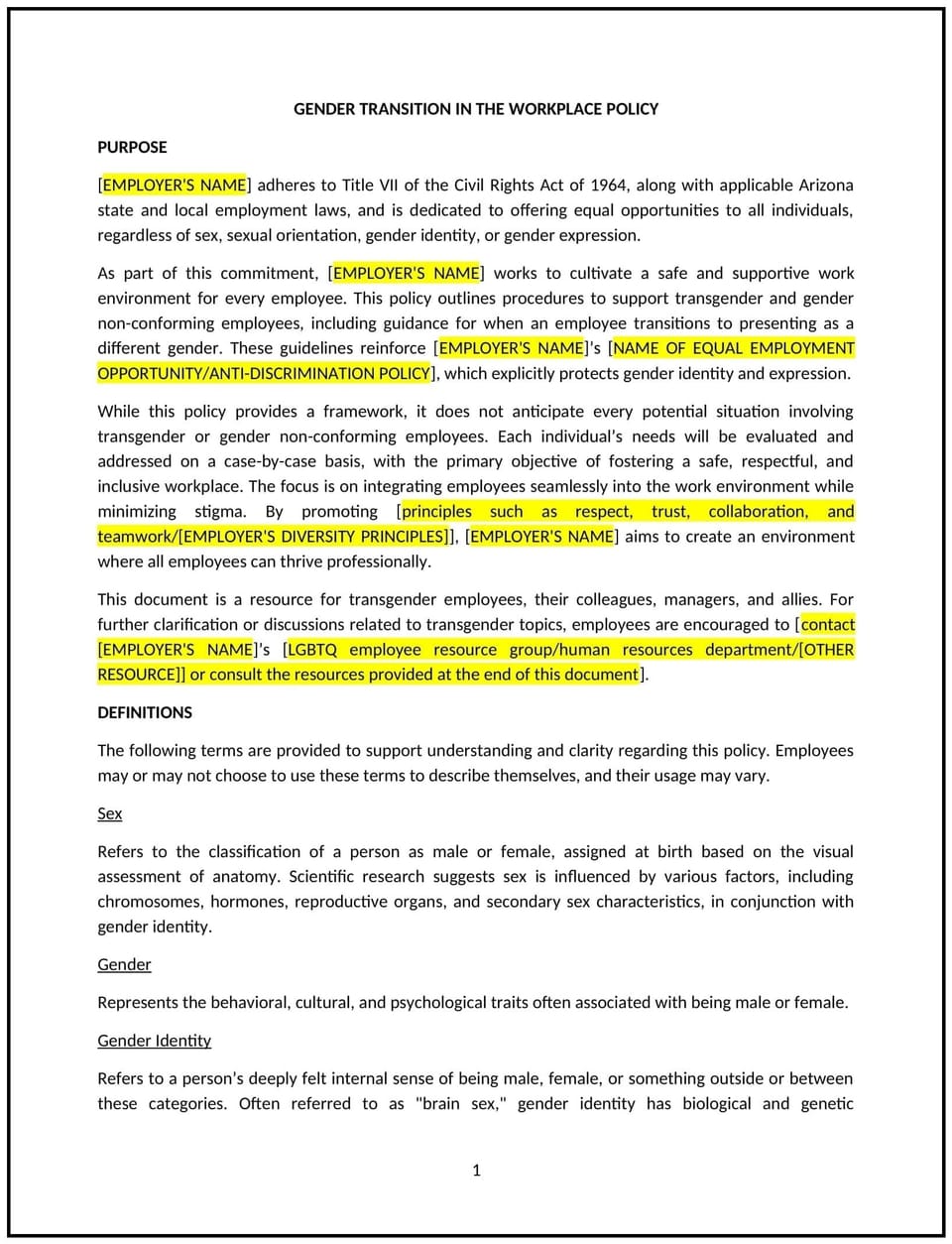Gender transition in the workplace policy (Arizona): Free template

Gender transition in the workplace policy (Arizona)
In Arizona, a gender transition in the workplace policy supports employees undergoing a gender transition by fostering an inclusive, respectful, and accommodating environment. This policy ensures that businesses align with anti-discrimination laws, such as Title VII of the Civil Rights Act, which prohibits discrimination based on gender identity.
This policy outlines the organization’s commitment to supporting transitioning employees, including procedures for workplace adjustments, communication, and addressing concerns. By implementing this policy, Arizona businesses can promote diversity, inclusivity, and employee well-being.
How to use this gender transition in the workplace policy (Arizona)
- Define key terms: Provide clear definitions of terms such as gender identity, gender expression, and transition to foster understanding among employees.
- Offer communication guidance: Outline steps for employees to notify management or HR about their transition and discuss support needs.
- Address workplace adjustments: Include provisions for name or pronoun changes, updates to records, and restroom or facility accommodations.
- Provide training: Educate employees and managers on gender transition topics, including how to support transitioning colleagues respectfully.
- Include anti-discrimination protections: Reaffirm the company’s zero-tolerance stance on harassment or discrimination based on gender identity.
Benefits of using a gender transition in the workplace policy (Arizona)
This policy offers several benefits for Arizona businesses:
- Promotes inclusivity: Demonstrates the organization’s commitment to fostering a supportive and diverse workplace.
- Supports compliance: Aligns with federal and state anti-discrimination laws, reducing legal risks.
- Enhances employee well-being: Provides transitioning employees with the support they need to thrive in the workplace.
- Improves morale: Encourages a culture of respect and acceptance, benefiting all employees.
- Builds reputation: Positions the company as an inclusive and forward-thinking employer, attracting diverse talent.
Tips for using a gender transition in the workplace policy (Arizona)
- Address Arizona-specific considerations: Reflect workplace norms and legal requirements relevant to the state, including protections under federal laws.
- Support open communication: Create a safe space where transitioning employees feel comfortable discussing their needs with HR or management.
- Provide manager training: Equip supervisors with the knowledge and tools to support transitioning employees effectively.
- Use inclusive practices: Ensure workplace policies and forms allow employees to reflect their gender identity accurately.
- Regularly review the policy: Update the policy to reflect changes in laws, workplace practices, or societal norms.
Q: What support is offered to transitioning employees under this policy?
A: Support includes name and pronoun changes, facility accommodations, updates to employee records, and a commitment to fostering an inclusive and respectful environment.
Q: How can transitioning employees notify the company of their needs?
A: Employees should contact HR or their manager to discuss their transition and any adjustments or accommodations they may require.
Q: What steps are taken to prevent discrimination or harassment?
A: The policy includes a zero-tolerance stance on discrimination and harassment, with procedures for reporting and addressing violations swiftly and effectively.
Q: Are coworkers educated on gender transition topics?
A: Yes, the company provides training and resources to educate employees on gender identity and how to support transitioning colleagues respectfully.
Q: How does this policy support compliance with Arizona laws?
A: While Arizona does not have state-specific protections, the policy aligns with federal laws like Title VII, ensuring anti-discrimination practices are upheld.
This article contains general legal information and does not contain legal advice. Cobrief is not a law firm or a substitute for an attorney or law firm. The law is complex and changes often. For legal advice, please ask a lawyer.


